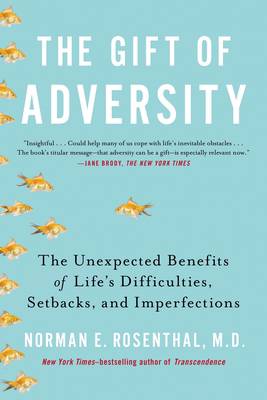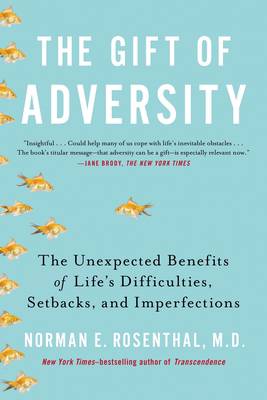
- Retrait gratuit dans votre magasin Club
- 7.000.000 titres dans notre catalogue
- Payer en toute sécurité
- Toujours un magasin près de chez vous
- Retrait gratuit dans votre magasin Club
- 7.000.0000 titres dans notre catalogue
- Payer en toute sécurité
- Toujours un magasin près de chez vous
The Gift of Adversity
The Unexpected Benefits of Life's Difficulties, Setbacks, and Imperfections
Norman E Rosenthal
Livre broché | Anglais
35,95 €
+ 71 points
Description
Now in paperback--this acclaimed book from Norman Rosenthal, the New York Times-bestselling author and research psychiatrist, shows how life's disappointments and difficulties provide us with the lessons we need to become happier and more resilient human beings. Winner of the 2014 Nautilus Award represents "Better Books for a Better World"--the Silver Award in the category of Heroic Journeys. Adversity is an irreducible fact of life. Although we can and should learn from all experiences, both positive and negative, bestselling author Dr. Norman E. Rosenthal, believes that adversity is by far the best teacher most of us will ever encounter. Whether the adversity one experiences is the result of poor decision-making, a desire to test one's mettle, or plain bad luck, Rosenthal believes life's most important lessons--from the value of family to the importance of occasionally cutting corners--can be best learned from it. Running counter to society's current prevailing message that "excellence" must always be aspired to, and failure or mistakes of any sort are to be avoided at all costs, Rosenthal shows that engaging with our own failures and defeats is one of the only ways we are able to live authentic and meaningful lives, and that each different type of adversity carries its own challenges and has the potential to yield its own form of wisdom. Using stories from his own life--including his childhood in apartheid-era South Africa, his years after suffering a violent attack from a stranger, and his career as a psychiatrist--as well as case studies and discussions with well-known figures like Viktor Frankl and David Lynch, Rosenthal shows that true innovation, emotional resilience, wisdom, and dignity can only come from confronting and understanding the adversity we have experienced. Even when life is hardest, there are meanings to be found, riches to be harvested, and gifts that can last a lifetime. Rosenthal illustrates his message through a series of compact, memorable chapters, each one drawn from episodes in the lives of his patients, colleagues, or himself, and concluded with a take-away maxim on the lesson learned.
Spécifications
Parties prenantes
- Auteur(s) :
- Editeur:
Contenu
- Nombre de pages :
- 352
- Langue:
- Anglais
Caractéristiques
- EAN:
- 9780399168857
- Date de parution :
- 04-09-14
- Format:
- Livre broché
- Format numérique:
- Trade paperback (VS)
- Dimensions :
- 153 mm x 231 mm
- Poids :
- 358 g

Les avis
Nous publions uniquement les avis qui respectent les conditions requises. Consultez nos conditions pour les avis.






